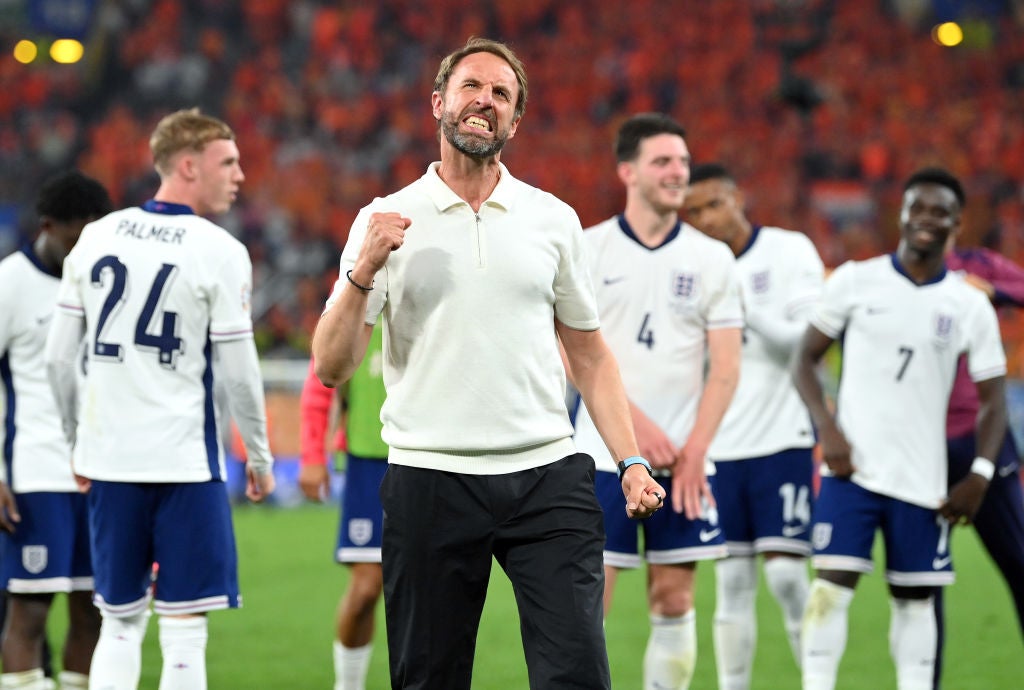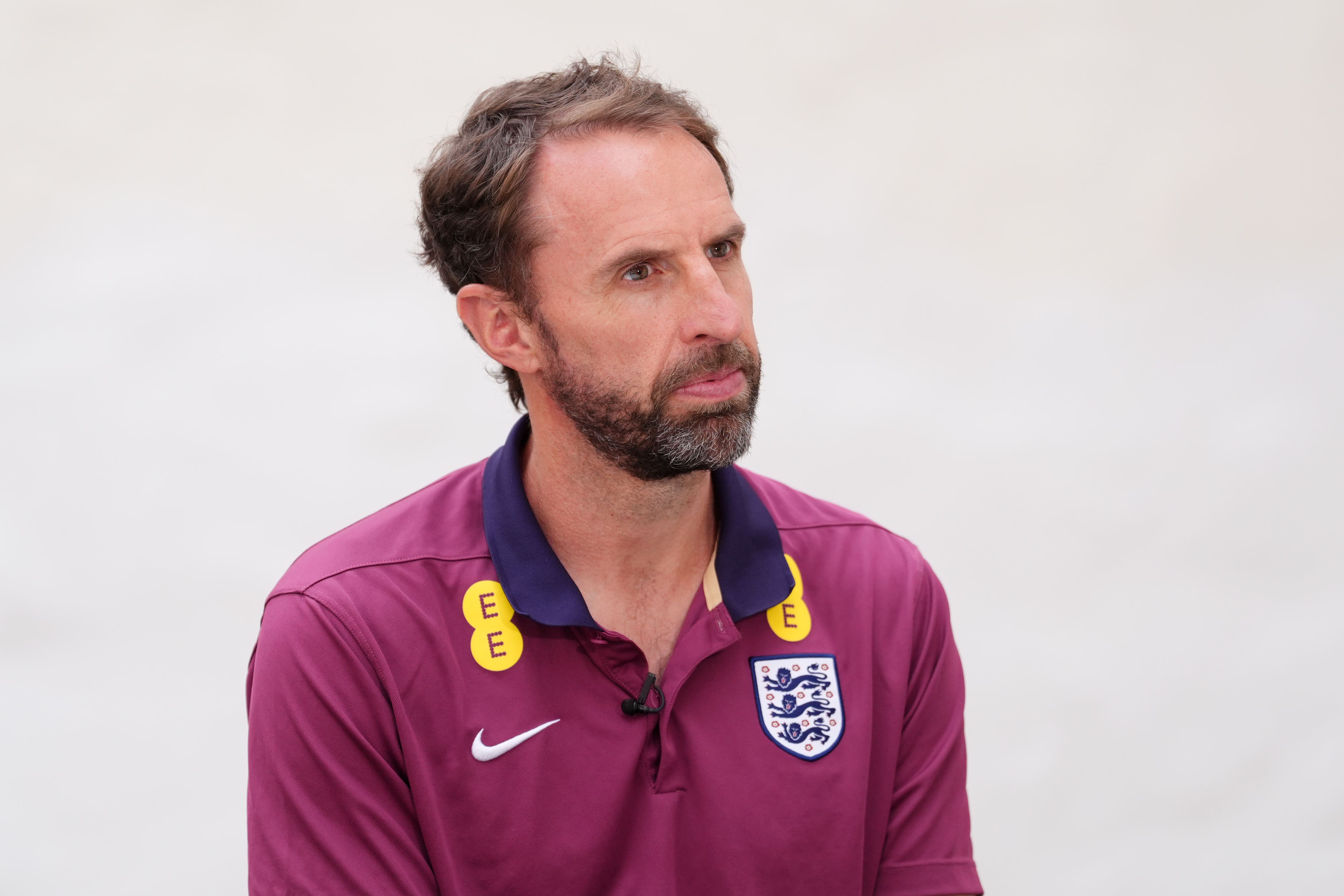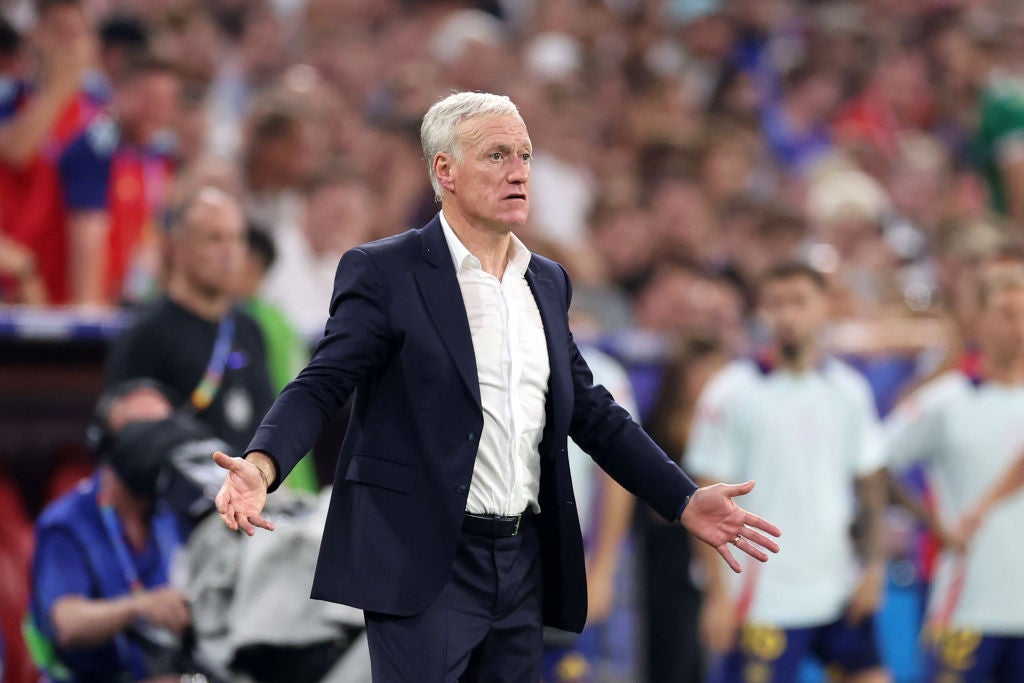Now that Gareth Southgate sits in the Blankenhain base talking about how England might win a European Championship final, he can make an admission. “There was a danger”, as he puts it, that this Euro 2024 campaign and his entire managerial tenure could have unravelled. There was certainly a risk of the “doom and gloom” engulfing the squad.
“But,” Southgate adds, “I was determined to confront it.” That went way beyond walking towards the beer cups being thrown after the 0-0 draw with Slovenia, although he still feels that was crucial “because we fought too hard to change the environment for the players”. More important was to actually work through what was going wrong - “a coaching challenge. That wasn’t necessarily on the training ground.” It involved showing the players what they were actually doing on video, and comparing it to their instructions. There was also just a photo.
“We’ve just drawn against Denmark, they’re on two points, we’re on four, they’re celebrating with their fans, we’re on our knees.”
The players were told: “We don’t want to see that body language again, we don’t want to see that feeling of defeat.”
How emotions are handled comes up constantly in a reflective interview on the eve of the Euro 2024 final with Spain, which is perhaps inevitable since it has been maybe the main theme of England’s entire campaign.
It was there in that cowed body language on the pitch during those turgid first four games. It was there in the fans’ anger and the cups thrown. It was there in Southgate’s response, and then the team’s response, as a resolve grew from the emotional release that came with so many late goals.
That evolution of mood can almost be tracked in isolated lines that most stood out from the manager’s sit-down.
“We live in what’s been an angry country… Hopefully we can bring some temporary happiness.”
“I am fortunate that I am the type of guy who you have to prod a lot to get a bark.”
“I'm an England fan in the dug-out, I have more responsibility now, but... I'm desperate for England to win and I was the same as a player.”
“I want to win so much on Sunday that it hurts, don’t get me wrong.”
And, as regards how might do that, there was a comment that was more telling about his actual running of the team.

“I know I’ve managed this period better than I did in Russia, but that wouldn’t be how it was viewed and it would sound like nonsense to the man in the street.”
The man in the street has had an overt prominence in the tournament, especially as regards the abuse Southgate has received. The manager has already spoken about being so “ridiculed” that “your professional capability is questioned beyond belief”. Southgate now says his ability to deal with that comes from direct experiences like the 2018 World Cup.
“It’s about being able to rationalise things better,” he said.
“I know the job and I’m really clear on being my own biggest critic, reviewing everything clearly, so I know there is a body of work there.” It is this that prompts the caveat about wanting to win so much “it hurts”, which is an unusual thing for a manager to say, if not a player. It’s all the more unusual given that, as Southgate acknowledges himself, he is usually so even-tempered.
“I can handle whatever comes and I know it’s not going to change what the dog thinks when I walk back through the door.
“That’s just how I am. I don’t know why that’s how it is, probably something I get from my Dad. He always managed his emotions really well.”
There is another aspect to this, which is as yet left unsaid. That is the question over why exactly Southgate provokes such anger. While much of it is fair and honest football opinion, some of that has been aggravated by non-football pronouncements. Southgate has previously spoken on everything from racism to the essence of Englishness and taking the knee. It has visibly angered some fans, and led to the manager literally being described as “the woke Mr Southgate” on one of Nigel Farage’s TV shows. The Reform leader has had his name sung by some England fans in Germany, usually preceded by “stop the boats”.
Southgate inevitably declined to engage on the election, just as he became less outspoken on bigger issues, including at the Qatar World Cup. There is an obvious question over whether he regrets the discourse of his first few years as England manager, given what it has influenced. The answer, for his part, is unequivocal.

“I don’t regret it because I think this is a position of responsibility. You have a chance to make a difference in things that are important. I have my values. I never wanted to impose my values on people. But I think there are some fundamental human values that, if you get the chance to model them, then you should.
“I think those values are important. We live in what’s been an angry country. I would love that to be different as we move forward. Hopefully we can bring some temporary happiness. But we’re not going to change our country either. Maybe we can deliver some good examples.”
That partly explains going out into the hail of beer cups.
“If we’d suddenly had this environment where it’s ‘I’m not so sure I did enjoy that’ that would have undone the progress we’ve made. So I felt it important to fight for that in that moment. I was the only one who was going to be able to do that really. And I have no problem if I’m the lightning conductor – to take that for the players. Because, in the end, that’s the job. The job is to allow them to perform at their best.”
Southgate has come to see that as part of his own job, pointing to the example of some of his most esteemed peers.

“I have to accept that Didier [Deschamps] has had lots of criticism, Pep [Guardiola] gets lots of criticism, Jurgen [Klopp] got lots of criticism. I’ve got my head round what that is now. As a 35- or 36-year-old, who had just walked out of the dressing room at Middlesbrough, I found that hard.
“Most national coaches here will have had criticism over the style of play, over selection or over results - it is what it is. Ours is maybe a bit louder because of expectation, history, everything else. But I understand it and that helps me rationalise it.”
That of course all leads to what the team has become, the emotional responses it now provokes, and what Sunday can become.
“I think we’ve changed how English football is perceived around the world. There’s still some questions to answer on that until we win. In the end people will still question that final bit and I understand that. But to have the consistency of finishes that we have is important for English football because I think everybody working in academies, with kids, with senior players, it’s in these moments you realise how much that means to them.
"Because they travel, they get comments about English football, it’s how they feel, that they’re on the right path with developing players and inspiring young coaches coming through. All of those things matter."
“But of course for Sunday none of them matter as much as winning the game.”
In the same way as Southgate now handles the criticism, he doesn’t think this Sunday will define him. There’s no great sense of seeking redemption after the missed penalty of Euro 96 or the missed opportunity for Euro 2020. He merely accepts it might be like that “in the eyes of others”.
“I would probably have felt differently about that three years ago, five years ago, but I’m in a different space now and that’s a good thing because otherwise I’d have been in a mess these last five weeks.”
He does have much more clarity on how to approach these “very focused” few days between the semi-final victory over Netherlands and Sunday, partly from the memory of facing Italy in this fixture three years ago.
“We got back to the hotel at four in the morning, up by eight or nine looking at Spain, looking back at our game, training the players that hadn’t played, then more meetings last night and back on the training pitch this morning… so fast-paced.
“In some respects you’d ideally like longer to prepare. On other respects the lads have been away a long time now and if you’ve ever been on a family holiday for a couple of weeks, to spend six or seven weeks with the same group of people… We’re in a lovely hotel, it’s fabulous, but there’s a reality around that and people are probably ready for the end.”
It’s about keeping those emotions in check for the last push. There’s then the bigger question of how Southgate actually feels, whether it has the same response. It’s all the more relevant given the open question about his future, and whether he even wants to continue.
“There's a little bit of nerves because, if not, what would that mean? The physiology of that is that your body prepares itself for battle and the human beings through evolution that's what it does.”
It is typical of Southgate to rationalise the irrationality of emotional responses. He is now simply aiming for an outpouring of his joy.










